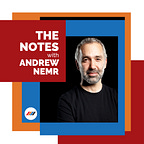Taking the scope of talking notes at face value, I’ve invited Christian Harbin into the conversation. We discuss spiritual formation, creativity, and the nature of joy.
About Christian Harbin // Xndrsn D’Artist
Christian is self-taught in the disciplines of realism, abstract painting and digital art. Born and raised in Mobile, AL, he honed his love for music and art from a very young age. In 2019, he moved to New York City and, soon after, began working in hospitality, serving the homeless. He now pursues a budding career in fine arts, utilizing his influences of music and visual design. Having triumphed over years of depression through his art, he creates with the mission of sharing its joy and healing with the world.
Connect with Christian
Website: xndrsnart.com
IG: xndrsn_art
Transcript
Andrew Nemr: Welcome to this episode of Talking Notes. I’m very excited to be with Christian, who is a visual artist. And we were introduced by a mutual friends Eva Ting, who was featured in a former episode of Talking Notes. And I’m just excited to get to know you. This is kind of like our first conversation. We had five minutes of, “How is life?” before we hit the record button. But Christian, for our listeners, would you mind telling us a little, just little bit about yourself and we’ll get into more as the conversation goes on, I’m sure.
Christian Harbin: Yeah, hey everybody, I'll do my best to keep it to a little. My name is Christian Harbin, I go by Xndrsn or Xndrsn D’Artist, and so I'm a visual artist. I'm originally from Mobile, AL, which is like a beach town right on mobile Bay which is right on the Gulf of Mexico. I moved up here about four years ago to New York City live in Brooklyn. Yeah I've been really just finding my joy with art, coming into year the 2022. I've always been an artist, but coming back to that in a more consistent way and in this new chapter of my life, I’ve turned and pivot into abstract art so that's what I do. Art is a conduit of joy for me, I want to raise awareness of mental health and also faith and the arts. I'm such a just big fan of it and all the ways that the arts integrate with each other and overlap and really just have at the start of a new career and horizons looking bright and really excited to be here thank you for having me.
AN: My pleasure. I'm super curious, I did not realize that the journey towards abstract art as a focus has been such a recent shift for you. What drew you into that?
CH: So, I was an artist ever since I could hold a crayon and that was like 3 years old. My parents, they they told me that would draw on the walls ever since I could hold the crayon. The the wall as far as I was concerned was jus a big piece of paper and it needed color on it, obviously. I didn't know that I had something really until first grade and my first grade teacher, she told my parents, “He's got something here.” You know? There was a field trip that my class went on that I wasn't able to go to. They went to this farm and when everyone got back from the field trip I was one of the few who wasn't able to go, again this is back in the first grade, the teacher was like, “OK everyone, I want the class to draw a picture of what you saw at the farm and experience that you had at the farm.” She came over to me just like, Christian I know you weren't able to go just do your best. So, I drew a picture of a horse running in the sunset this green landscape. These are like purples and oranges, and that kind of blew the teacher away and she talked with my parents and then we had a meeting and I got put into to get gifted classes and things of that nature.
But art has always been my go to. It's always been a safe place, a hallowed place for me. I stopped at around age 13. That was the year my parents divorced. And still to this day don't recognize whether or not that was…I don't know whether or not that was directly correlated to the divorce or not, but I knew I change should happen. From that point I had taken a music, poetry, and namely jazz music which I love. Jazz is where I start. It’s where I end. All forms of jazz, every type of jazz in between, all this derivatives and just really became a student of that. It wasn't until really the tail end of my 20s that, having gone through so much depression and anxiety and suicide ideation and just a lot of mental drama and financial trauma that you know came with you know just trying to figure out your way and get your footing, I came back into art in 2022 – consistently came back into art in 2022. I hadn't been really doing art consistently for about 15 years. I tried to start, just couldn't get myself back to it.
What ended up happening was at the end of 2021 I was on the church retreat here in New York, with the church plant that I'm part of – shout out to The Borough Church – and we had a portion of the retreat where everyone kind of moved away from their separate spaces. The Lord was already dealing with me for months about cutting my hair. Now this dude that you see here, it was higher, and for some weird reason the Lord just wanted me to cut my hair. I was like why do you want me to cut my hair? He told me, you've been in this depression you've been in the season for seven years. It hasn't been seven years. Check your social media, and I checked it and I looked at the first picture of myself with this hair it was seven years ago going on 8. Not to get too deep into numerology or anything like that but eight is the number of new beginnings and so I was like wow, what are you what are you doing? And He was like, just cut your hair.
I got real just vicious about it. For me my hair was kind of like the last hurrah, the last thing that I had to hold onto from all those years of tumult and depression. You know, there was evictions involved and repossession and financial trauma and extremely low self esteem and not fitting in and not feeling like I measured up as a man and the environment I was in which is all wrong for what God had given me which is why I moved to New York. So many things just in my head, like this complicated just salad of emotions. I felt like having my hair intact for some way, it was like a symbol of like you know I triumphed over this and you know, I'm still growing, and we're good and, God was like. “I want that.” I was in tears by that point, and a couple months later went on to cut it was the beginning of 2022. So January 16th 2022 cut off the top and cut off my facial hair as well, just in case God was like cut that off, too. I wanted to beat him to the punch so I could not feel even worse than I was already feeling.
I was just, told my barder Luigi was like cut it all off. He was like, “You want to cut it off?!” “Yeah, yeah, just do it, just do it.” I looked like a turtle for a few months, but we were wearing masks still at that time, so nobody knew. I kept my face covered because of the mask.
One of my housemates, Mike, an amazing musician from the local area, he wanted to go to this jazz lounge. I went there with him…he asked me to go with him. Went with him, and some beautiful energy just sparked in me from that time at the lounge. I think is February? February of 2022. I don't know what this is, this energy, this beautiful. I already loved, you know, I really love jazz, and so that was just like that’s all I needed to hear. And this beautiful just spark, it was just like a fire, just like sparked in me. I was like this is such a beautiful moment, such a beautiful place. The music is just so amazing like this is enlivening me in some way that I just haven't felt in a long time. I want to draw, I want to paint it. So I bought some art supplies, and that ended up being my first picture, Brass Jazz, which was featured in my first art show that I had in the same year of 2022 in September.
From there on, February on, I just started just making work, and really paying attention to the joy that I felt inside. It was something that I hadn't felt for a long time. Then I recognized, oh, I gave Him my hair, He gave me my spark for art back. It’s like a full circle moment, and it's really resurrecting so much of the joy that I had as a kid and has helped to walk me through and walking out of the remnants of severe depression and has helped me to find myself again and regain the clarity and to just also be that kind of agent of confirmation to the calling that I'm called to.
I know it's like up and down story but like yeah that's how I’m here.
AN: It's really cool. It strikes me that the request was for something physical. I'll share this with you. There's a there's a documentary done on me called Identity back in…oh we started in 2017 it got released and it was completed in 2019 got released January 2020. At the time I had long hair, had a man bun pulled in the back, and there is an image on one of the shoots where I'm up at the top of the staircase there's the sun behind me and I'm in silhouette. And so you see the silhouette of the man bun. And one of the producers came up to me after watching that, he said, “Well too bad man, you can't cut it off now.” And I just felt like oh. I held on to it I think a longer than was necessary but once I had, literally had the opportunity to cut it off, I did. I went from like all the hair to literally nothing. And there is a sense of relief. A sense of, I'm not bound to this thing, that didn't really hold as much meaning as what I'm hearing from you for. But there is something about the way we see ourselves and our identity, like the self perception, that I think we can hold on to, to a degree, that is not beneficial for us. So it's really interesting to hear your story, that that was the first thing that you can kind of put your finger on, and say I did this, and then all this other movement start happening. What club was it? Because I used to be in the jazz scene in New York for, I mean that was kind of my stomping grounds for a while.
CH: Yeah yeah yeah. You have heard of NuBlu?
AN: Oh yeah! Sure!
Yeah, the Lower East Side. Ray Angry and the Council of the Goldfinger. They are a fantastic band, and they do their set for about an hour, they have a DJ set for about 45 minutes to an hour, and then they do a third set which is completely interactive. Anyone in the club can come up on stage and sing with the band. They switch out musicians. People come in around 11pm with their instruments into the club and you'll also see another celebrities there. It’s a really good vibe. It's a communal vibe. They don't do covers of any songs that's the big rule. It's all improvisation and it's all just like fill in the box. So it’s just like this interactive communal scene, that is just so transcendent, and I think that was the thing for me. I like the point you made though about the identity, identifying with the hair. I think that's what it was. I think that was it for me. I needed in some way to be consciously aware that a change was coming and I needed to in some way be fully vested in that change taking place, in order for me to be able to fully embrace the moment. Otherwise, had I not cut my hair and given up something that was so valuable to me I may have drifted into that moment. I may have still drifted into that, but like just completely unaware of what this meant for me and and the transition that was meant to be made so intentionally and it was meant to be like the kind of turning point. I think to your point, and at least for me it was also just an awareness, a certain level of turning my attention from one thing to another, and as you know when God marks off the the end of a season he's like OK stop, let's go. I remember when, like in the Bible, children of Israel, God gave them three months to mourn Moses passing and then he was enough. It's time to go, y'all still aren’t in the promised land yet, you're still not there, you're almost there, you're still not there, I need to bring you there, and you're still not there, you have had enough time, let's go. I think for me, embracing God's move and how he wants to move in my life, that's not something that can be done passively it must be done with attentiveness. It must be done with your whole self, and so that exchange was – yes, it was a costly exchange for me but God gave me back for it was so invaluable, so priceless. I mean that's probably the only thing he could have given me that was worth you know me cutting this, which says something. It really does say something, like wow how much creedence and emotional vestment do I give to my hair. Not to mention the fact that it can grow back.
Where was I at? But you don't realize that until you look back, and you're like, whoa whoa whoa whoa whoa, really that was, OK, wow, I didn't see how hard I was holding on to that. I didn't realize how deeply ingrained in me that was. I'm glad that God took me through that and he was really gentle about it. He was still like let's go.
AN: I think it also speaks to like where you are now to be able to look back and say wow, I was like that with my hair?! And not feel a sense of condemnation towards yourself in the looking back. That to me is a witness of the kind of experience that you've had with God in the journey. That you can you can look back at a time where you know, the fist was clenched and the attention was given to things of material matter, but not necessarily of more importance than that, and still feel like, wow that was a thing, and I'm different now. And it's all good. I'm still with the person that loves me and things are all good.
CH: I love what you said…
AN: There is something else that you mentioned, I’m trying to track it now. I've lost it. We'll see if it resurfaces. Oh! In much of the thinking around spiritual formation there's the idea of indirect action, where we do something in this area of life that effects this area of life. We as human beings don't really have access to our complete inner selves. We have access to some of it but not all of it. We can only work in the areas that we have access in, and then we have to leave it up to God to do the work in the areas that we don't have access in. So again, this idea that it was like something physical that led to something spiritual. I don't know, if I'm going about my day, I don't know if I would normally think that way, to make that connection, even to be aware of those kinds of things. It strikes me that to have had the the connection already to sense that a request was being made of you and that your attention was being drawn. That's kind of gift upon gift. The other way is to go through the same kind of moments in life but not have the awareness and not really have a a sense of what is happening or what might be happening.
CH: I love the way you said. I think that's where the mystery creativity comes from as well. It comes from the unknown. It comes from the unseen. You can plot out a piece of work if you want to. Even that maybe comes from a place that is unseen, you just supposed upon it and it happened. I think, because when you said that we don't know the fullness of ourselves, along those lines, I think that's the magic of of life in a lot of ways. What I saw when you said that was kind of like this divide, even between spirit and soul. I would consider the soul is part of me to be actually tangible because of the work that comes out of my soul but the spirit, the spiritual component, like the very life force that empowers that, there's so much in that. I think because we can't always perceive it you know it's many times depicted as like this empty space, ambient, hollow, open, abysmal, kind of thing. When really and truly it's rich, and full, and layered, and it's a whole different dimension of reality that is so full, and so substantial, and so great, and just so saturated, with so much in it, but because we don't see it, in that we live in that realm in real time, because we’re in the natural realm, I don't think we recognize how much of an impact it has on our reality. But also, just like, what bounty must reside in that realm? It's always…I was earlier today just joking with God and I was just like you know, “If you ever try to you know talk me out of from conquest again, the first question I'm ever gonna ask you is, ‘OK what's gonna happen that you're not telling me about? What's in this that you know like you got something you're trying to get my buy in, what are you not telling me?’” It's kind of one of those things it's just like there's just so much that comes into play with in the reality of our existence and how the moves of God in us and through us and how it's tailor made specifically to us and how it also – it's just again there's so many and varied – I was half asleep, I also do music as well, but I was half asleep uh this morning and there was like this melody's syncopated like tune that came to me, but I was too sleepy to like get up and like record it vocally. But stuff like that happens all the time so why does it have to happen when we're sleep? That type of spiritual whatever, you know, some people call it the muse, some people call it the genius, you know comes to us to give us that. I'm really just so much into the mystery of that. Going into even like the example of not knowing whether or not my parents divorce had anything to do with me stopping art at the age of 13. I just know that those two things happened in the same year, but I don't know if there's a connection. I just know those are two major things that happened. But maybe they are connected and all that stuff in between that makes the connection, I'm just not aware of. I love that, I love you raising that point, that was beautifully said.
AN: Thank you for kind of drawing the connection between kind of the the mystery of the unknown in life and how we're, particularly for creative types, we can engage in that and touch on it in our practices on an ongoing basis. There seems to be a multitude of ways that different artists begin to conceive of how they relate to that process. But I think at least for me, and I enjoyed hearing from you that there is a kind of mystery at this at the center of it. In my process, you know there's language of creation that happens around the arts a lot. For a very long time I resisted that language. My process was less of feeling like I made a thing, because I never felt like I never felt like I made out of nothing. Generally speaking human beings don't make out of nothing, we make out of out of something. Even if that thing started with an idea that we don't know where that came from. So, I always conceived of myself as a, like an archaeologist almost, where I was digging for things and searching for things, and if I found it, it already existed. And so my role was then to bring that to life for others, but it was very real, and more often than not fairly full, or fairly complete, in my mind's eye when I found it. It's like that moment where, and I'm assuming here that you've experienced this as a musician, you know a melody comes to mind and that melody existed. It's not that you made it note for note, right? It was, it's just there somehow and so I'm thinking that there's almost a connection between that idea and the way that you described the spiritual life, or this the spirit in general as full and bountiful, and that when we're able to more consciously connect with that, I guess, in a way, we experience more of what already exists and what is maybe not in the material but at least in the spiritual, that we can then be part of bringing that to life.
CH: Yeah, I love the way you speak.
AN: Well, thank you.
CH: I think that's one of the reasons that the spiritual, it has to exist in eternity, because the vastness of what's possible, and what can come from that realm, it's just too much for a time bound dimension like ours. As you were speaking, I was thinking about, when you were saying that it already exists. I think that's totally true. Totally true. It does already exist. It doesn't come from us, it comes through us, because if it already exists and we were graciously selected by God to bring it into the world then what he's doing is he's inviting us on this journey, that is oftentimes very healing and very affirming of purpose, and it brings a level of fulfillment to – the word that's coming to mind is fabricate – to fabricate what already existed but is unseen. Just because it isn't seen it doesn't mean it doesn't exist, obviously. But at the same time, we are, it almost seems that way like it came from us. It did not come from us, it came through us we just get to experience the joy of fabricating it into the physical realm where others can see it, or where others can hear it, where people can feel it, at the end of the day. And I think the purpose of that is to a lot of the points that you made, connect people with the awareness and the consciousness of the spiritual realm, which is so much greater, and so much vaster, and so much wider, and fuller, than this realm that we're in now. Which is super important. It's like constant douses of, you know, just beauty and wonderment and grace, and if we pay attention to it, and really open up space for that to happen, it makes our lives more beautiful, it makes the world a more beautiful place, it causes people to think on the higher level, on the higher playing field than the temporary, than the things that are sure to rot and waste away. There's a greater world or realm that's out there that's so much just vaster than what we can imagine.
AN: That's beautiful. So a question comes to mind. There's a theme in your work, and we'll have a link to your website in the show notes for folks to go and and bear witness and kind of see what has come through you. But there's a theme that's the logo. It's the comb, like teeth, the smile, as you describe it. Tell me about that.
CH: That was an element that I really was drawn to, just as a kind of rythmic pace setter in my work. And I found that the more I kept doing it, the more compositional balance that it created with the work. It was there to establish rhythm and to make things makes sense or it'd be perceivable, even if there was no real wording to what you saw. I know you understand that as an artist. A friend of mine pointed that out though, because this was something that I consciously kept coming back to. If it's not the actual logo itself that you see, or see resembled in the art, it's going to be three parallel lines, 3 short parallel lines. She called the bear claw, and she pointed it out.
I was really thinking about that and seeing why it was super important to me, and ended up coming up with that the comb design. Those extremities of the comb are called teeth. And I, like you said, wanted that to become then the symbol of joy, because I recognized how much joy being in art again brought to me. And then that fed into the kind of model of my brand, which is “Let joy be.” So it's about allowing joy to be felt, to be experienced, to be a part of our existence, and how we move through the world. I think that's important because we have kind of ousted joy in a lot of ways. So I wanted to make up a symbol for it, because it, joy for a lot of us, it tends to be, from a social standpoint, either relegated to, it's either infantilizing or it's super effeminate of the thing to even talk about. I really zoned in on why it felt infantilizing because, I know I need joy, I know we all need joy, it's essential, but why is it not such a thing that we hold in high regard. And that we are searching for, and why is this word not as articulated. You know, we can say fulfillment. Which is very important to have, and I believe the ultimate success is fulfillment. We can say bliss. We can say being in your groove. You know, being in the pocket, in your zone, in your bag, but joy. You know, so why is joy, why is saying that seem so infantilizing, or so just frivolous? And I realize, and this is just a theory of mine, that for most of us the most recent…I would say the most identifiable time of most of our lives that we’ve experienced joy is when we were kids, is when we were in that age range. Especially when we were infants, you know, we were running around the house just with a diaper on, you know, swinging spoons of spaghetti around, and you know, that was joy! That was bliss! We didn't have the the pressures that adult responsibilities on us. And we didn’t have the pressures and the weights of all the things that come with having a formative life and being a formative part of society and all this kind of stuff. You know, we weren’t taught to fear. We were just in our rawest, purest, most untainted state.
We were able to exude, because somebody else took care of all that other stuff for us. And they made space for us to be able to smell the grass, and to share ice cream with our dogs…
AN: So many images of, as you're discovering, just come into mind…
CH: You know we played in puddles in the rain, we jumped and jumped and jumped and, until our parents were like, OK, c’mon. We were scared at the sound of Thunder, but in a very fun and amusing way. We read books and, you know, we have flashlights, and we played pen games. That's joy, you know, but it's so notably recognized in the times that we were younger, and I think that's why I feel so infantilizing, because it almost feels impossible. It almost feels like it's not as realistic of a thing to be able to experience as an adult.
There's that phrase, I know that you probably heard it. The artist is the child who survived, or the adult artist is the child who survived, because that inner child is still alive in them. So, when it comes to the logo for me, it was about having a symbol in place that could serve as a reminder of all of that. That joy is not something that I don't think we have to conjure up. It's something that we allow to be experienced in our lives. We are the gatekeepers of our own joy, I think. But that takes a high level of vulnerability which is just hard. Dr. Brené Brown talks about how it's, you know, foreboding joy…We don't want to lean into it in case something happens, and it's taken away from us. The trauma of loss can be worse than just the loss itself, like not having it at all. So we barrel along through life just not having it, but we absolutely need it. I think it's one of those things that helps us to just be present the way that we should and to be be decent to people. So, the logo holds all of that within it to me. That's what it represents.
AN: That's beautiful. There are a couple of things that come to mind. One is hearing you speak about all the things that are in that image helps me understand why that image is so captivating for me. Sometimes you'll see a design or you'll see a particular kind of piece that's iconographic. It's like an icon, it's like a just a single thing. Some draw me in and some don't, and I don't think it's purely aesthetic. It's just really sweet to hear all of what's inside, this what essentially is just an abstract image. And even out of the context of a full piece where there might be multiple or one kind of featured element, it still bears a kind of invitation when I see it. So that was really sweet. Most folks who have either read my writing or who have listened to me will know that I'm a Dallas Willard fan, and so when you speak of joy the first thing that comes to mind for me is Dallas's definition of joy. He was the kind of guy that if you're going to talk about words he wanted definitions before we even opened up the conversation. And that approach has been super helpful for my own journey, because I was someone who grew up in a family that embodied a lot, but wasn't really wordwise articulated everything. So, I understood joy, but I never have a definition of it. I understood love, but I, you know, it took me a long time to get a definition of it. So Dallas's definition is a pervasive feeling of well-being. When you started talking about kind of the examples of a childhood that was filled with joy, it's like that the liberty that comes in thought and action when you have a pervasive feeling of well-being. It's like, yeah, I can throw spaghetti on the wall, and my life is still OK. Like, there isn't gonna be, there's not the the fear of something that's going to come for a wrong choice, or like condemnation that’s beyond correction. Right, it's not correction, it's condemnation for getting spaghetti on the wall. Correction might come. But there isn't kind of an inherent fear of condemnation that begins to limit action right. And that to me drives straight to the idea that you know, one of the propositions of the Kingdom of heaven is that you can't enter unless you become like a child. All the things that are connected to that, not only the the idea of a beginner's mind, which you know many artists sit with. It's like I don't know enough to be able to plan everything so I have to come with some sense of wonder and curiosity and that allows either a peace to be made or a journey to be started in a different way than setting out all the goals and metrics and just checking them off as they happen. And also this idea of joy that in those journeys and in those those kind of experiences that there's an undergirding of well-being that is different than the kind of stress that comes from experiences like very legitimate experiences of lack, or pain, or loss, or potential lack, or potential pain, or potential loss, that I think serve to, like that frame serves to prevent us from feeling free to act, or even free to think, in a way that new things or new ways for ourselves as individuals or even for the the communities that we're a part of can begin to emerge that are fruitful. All that started spinning for me and it is really beautiful to hear you hear talk about it.
CH: I follow this guy on YouTube, he goes by Struthless, this Australian guy, illustrator animator, producer, does all the things. He has a really great channel. He was talking about the vehicle, he was talking about doing tasks – and want to make sure I don't get it wrong – he was talking about getting things done, and what is the vehicle through which we kind of get to our destination. Hearing you say this about well-being, it's like maybe joy and then that sense of well-being and that pervasive well-being, kinda is the vehicle, or is like at least the seat belt, in some way that just kind of secures the movement to the destination. I believe that the destination is definitely, you know, God's will being done in through our lives. But the well-being that we so need in order for us to even course our path through that, I think a lot of us have been disarmed from that well-being, which makes us afraid to then chart our course and move forward into into that destination. So, perhaps joy then – and I really feel like this – because it makes sense then that joy it's like a form of security. It's like, I don't know how to, it's the reassurance that you have. I know the word talks about the joy the Lord is your strength. Maybe if it's not the vehicle maybe it's the fuel and maybe if it's not that, maybe it's the seat belts that we wear. Maybe if it's not that, maybe it's the kind of internal accommodations of the vehicle that you're in that keep you able to accessibly work all the mechanisms that it takes to drive. I think the bottom line is that joy is not frivolous, it's essential. We need it. We need it. It's something that we can't continue just as a people, and people groups, and a nation, we can't continue to sweep that under the rug. We need that in order to in some way encapsulate our efforts so that we can safely get to the destination that we need to get to, that we're meant to to to get to. And I also think like, even like, in its practical kind of utility, I think also that it's such a gracious thing from God to allow us to experience that. Like, we not only have it for a sense or sake of this childlike faith that it spurs, but it really, it's a beautiful feeling to experience over and over again. It just reiterates that sense of well-being that we that we need, and I think it exudes from us to other people. That constant beacon that inspires other people to let themselves lean into joy as well.
AN: That feels like a perfect place to kind of put a pause in our in our conversation. An analogy worth working out, but joy as security is something that I will be pondering for for a while. Christian thank you very much for taking the time to be with us. Before we say goodbye where can people find you. Well, we'll put all the links in the show notes but let us know just let us know.
CH: Absolutely, you can go to my website xndrsnart.com. I'm also on Instagram at xndrsn_art.
AN: OK, great. Well, thanks again for kind of bringing us into your world a little bit. Sharing just this small bit of where you are, and we look forward to continuing the conversation at some point in time.
CH: Absolutely. I honored, thanks for having me on.











